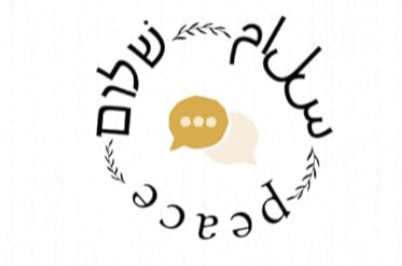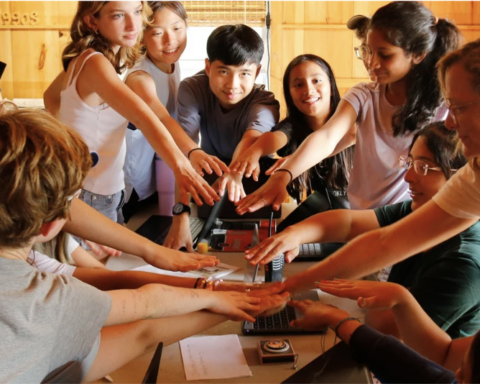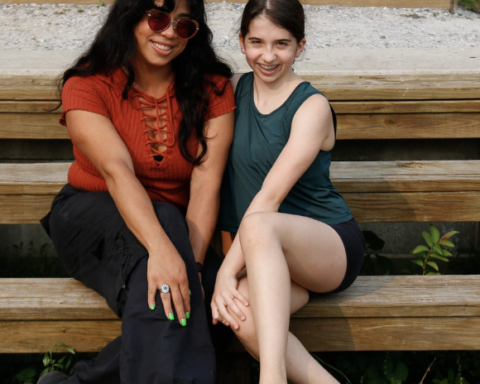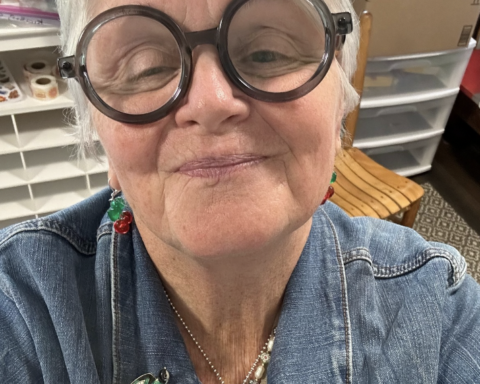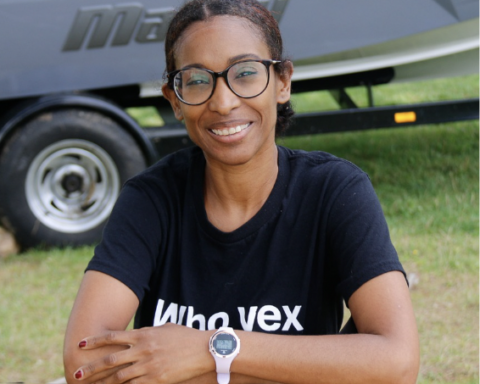By Maxanne Wallace-Segall, age 15
The Israel-Hamas war, despite taking place in the Middle East, has roped in governments, communities, and people across the world. Whether in the form of emotions, violence, opinions, or advocacy, much of the world has been impacted or contributed to the effects of the war. American teens have found themselves in a unique place since October 7th: The United States of America, as an international mixing pot of nationalities—and therefore replete with Jews, Muslims, Christians, Palestinians, and Israelis alike—is Israel’s closest ally and provides Israel the most aid of any other country. American teens also spend a large amount of their time online, meaning most of the information and content that we consume concerning the war has circulated through social media. All of these factors, combined with the upcoming presidential election, give our generation in America a unique relationship with the Israel-Hamas war. When Israel-Palestine comes up in conversation among US teens, a roil of emotions, thoughts, memories, and history surfaces; I set out to understand them.
Here in the US, many people’s ideas and perspectives on the war have had space to develop as violence has worsened, more lives have been lost, and how teens spread information regarding the topic has shifted.
Before the October 7th attack, the majority of campers knew very little, if not nothing, about the ongoing tensions in Israel-Palestine. Campers who had learned about it had mostly learned about it at home: many Jewish campers had been taught about it in the context of their heritage and family, and held a positive association with Israel as a whole. Non-Jewish campers tended to have neutral associations with Israel, knowing little about it. This meant that October 7th was experienced in a million different ways across the world and US: while some campers said they hardly heard about the terror attack with exception for social media posts, other campers were mourning family members that were victims of the attack.
Jewish and Israeli-American Upper Camper Lili Sella, shared that she had had a second cousin kidnapped in the October 7th attack. “She was in a kibbutz in transit when it happened, so no one really knew where she was,” Lili said. “My dad was in shock. Her and her daughter were gone. Even with the news coverage, it took me a week to process. And then, a week later, I saw photos of the hostages, and I just started sobbing.”
As pressingly, many Muslim people, Brown people, and members of the Arab diaspora dreaded what October 7th would mean for Palestinians and for them. Indian-American Upper Camper Asha Harker explained that many Muslim students at her school feel very connected to their co-religionists in Palestine, even if they are not Palestinian or even Middle Eastern. She talked about how many Brown Americans, even non-Muslim ones like Asha herself, had similar, connected experiences, and read similar news sources.
Many teens who felt no particular connection to any groups involved in the October 7th attack – and the punishing response by the Israeli government – were left to take their cues from the social media posts of people in their circles. Many campers said that they honestly had no idea what to feel or think, so whatever views they took on often depended on their impressions from the loudest voices around them.
Campers talked about how they tended to avoid conversations regarding the conflict immediately after October 7th, intimidated by the press of contrasting viewpoints. Starting conversations was scary.
Campers educated themselves in different ways following Oct. 7th. Most of our generation heavily relies on social media for world news; this applied to the conflict, as well. Senior Camper Bryce explained their see-and-check research method: “I would see a lot of posts on social media. I tried to find the most neutral and factual sources as possible,” they said.
“Whether or not I believed the posts I saw was different. It depended on their [the source / person posting] religion, where they were from, if they were avidly in support of one side or the other.” They explained that they made an effort to confirm their facts or opinions with people who they believed shared their values.
Some, like Upper Camper Elise M., turned to history books. Elise read a combination of books written in the 1900s at various points in the conflict by both Israeli and Palestinian authors and books written more recently, written by authors relating a range of perspectives and nationalities, in order to gain a fuller understanding of the historical context surrounding the violence.
Every single source, and every writer, holds bias. When campers sought sources with minimal bias, they were more likely to find raw facts closer to the truth. When campers sought sources that shared a range of different biases, they often came out with a much fuller understanding of all perspectives in play.
Campers were divided in their preferred sources. Asha reads mostly encyclopedic sources, like Wikipedia and Britannica for historical or background context, and CNN or the New York Times to learn about current events. Lili discussed how international news sources, like BBC and The Guardian, were often less biased than US News sources like The New York Times, and therefore better to research from. She also brought up Haaretz, which is a progressive Israeli paper that supports Israel’s right to exist, but publishes bold, often scathing critiques of the current Israeli government’s handling of the Israel-Hamas war. “It’s what my dad reads,” she added.
Words and ideas themselves mean different things to different campers. Zionism, for example, meant a hundred different things to campers. Zionism is defined by Oxford Languages as the “movement for the re-establishment, development, and protection of a Jewish state now known as Israel….” The word has become tinged since October 7th and is now often associated with the small but growing group of extremist Israeli nationalists.
Senior Camper Mariela first heard Zionism described in the context of her family history; at a young age, her dad told her, “We come from a long line of Zionists, and you should know that.” She continued to talk about how she wasn’t sure if she herself identified as a Zionist because people too often conflate Zionism with Kahanism, a violent, extremist, Islamaphobic Israeli nationalist movement.
“I associated Zionism with a more radical, geopolitical part of Judaism,” said Asha.
Many other campers also had a negative association with Zionism, because of how both far-right Israeli-support extremists and far-left Palestinian-support extremists use the word.
I’ve grown up learning about Zionism in the context of the Holocaust and perseverance for the Jewish people; one of the parts of my people’s history that gave us hope for the future. Meanwhile, others were taught that Zionism was the movement that sought oppression of the Palestinian people.
For some campers, coming into their opinions felt like more of a personal journey and fight rather than one entirely about the world or conflict. “I was scared to learn more about the Palestinian side of the issue for fear of how people would see me. At first, it was personal, but now, it’s about the world,” said Bryce.
In Upper Camper Yanic’s eyes, “everyone wants to have an opinion, and you might as well have an opinion, and so they never actually change their opinion or let their feelings waver because they decided that was their opinion.” He continued: “Including me at some points, [people] are jumping on the bandwagon. That leads to a lot of misinformation and less representation from people who are actually going to be affected by it.”
As Yanic explained, not only are people roping in emotions regarding their family, religion, nationality, and community, but our generation is young; our urge to fit in with those around us adds a personal, and often harmful, element that can obstruct real dialogue.
The opinions people finally did form differed dramatically; some sought an imagined middle ground while others explicitly moved away from it.
Bryce, for example, said, “At first, I tried to find a middle ground, but at that point, being silent was pro-genocide. I didn’t want to not have an opinion because it was important to me to have one.”
Other campers referred to finding the middle ground as the strongest stance they could take. “I started looking online, and there was a lot of Islamophobia and antisemitism, and not much in between,” said Mariela.
Like Mariela, I’ve often sought an “in-between,” and I’ve managed to find one. Beyond family experiences and academic research I’ve done, I’ve attended intentional spaces with both Muslims and Jews in which we intentionally sought understanding and empathy. Actually experiencing an “in-between,” where the humans in Israel and Palestine alike are valued equally, and the perseverance of both states are equally valued, has led my perspective and opinion on Israel-Palestine to a loud middle-ground.
Lately, the decrease in teens advocating and posting about the conflict in their circles is striking and noticeable. Some campers observed in this a flaw regarding how our generation cares and advocates: as soon as one big issue “settles down” and isn’t as popular, the search begins for the next.
Asha pointed out a possible upside:
“The people who are still talking about Israel-Palestine, in the present moment, are more apt to compromise,” she said. She explained how Kamala Harris’s focus, in support of the Biden administration’s foreign policy initiatives, was previously on providing the IDF with funding and weaponry; as time has gone on, she has stated her support for a ceasefire. Our generation’s preoccupations are so closely correlated with social media’s algorithms of fad popularity; and in this case, this algorithm is acting as a filter, leaving mostly teens who care about the conflict for reasons other than fitting in, still speaking and posting about it.
Discussions about Israel and Palestine, regardless of demographic and nationality, are always tricky. But for American teens, nearly every aspect of our lives, from religion, to upbringing, to nationality, to social circle, to algorithm, to emotion, to research, to identity, intertwine. There are 201 campers at WriCampia, meaning that there are 201 different ways that the Israel-Palestine war has been experienced. Reaching peace, understanding empathy, and coexistence, begins by understanding the human emotions beneath every word we speak.
